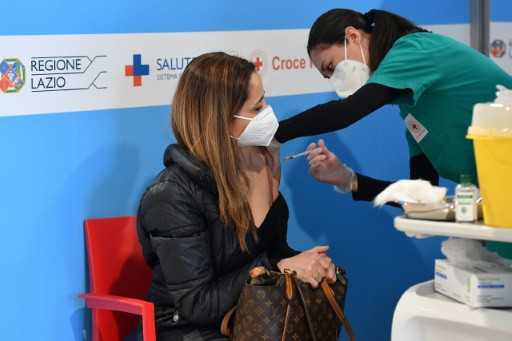EU looks to protected vaccine supplies for jabs ramp-up
09 March, 2021

The EU said Monday it really is working to secure a huge increase in COVID vaccine items from next month to recuperate from a disappointingly slow start to its jabs rollout.
The urgency of the push was underlined by Italy announcing that its toll of virus deaths had topped 100,000.
Meanwhile, former EU member Britain reopened its academic institutions as a hardcore lockdown and successful first-jabs course brought daily infection quantities down 90 percent from where they were two months ago.
Signs of monetary revival found in the U.S. -- where vaccinated persons is now able to mingle unmasked per the most recent medical recommendation -- also indicate the world's wealthier countries aiming for a mid-12 months bounceback from the pandemic.
But people far away and territories are struggling, including in Syria where President Bashar al-Assad and his wife Asma tested confident for COVID-19.
Israel -- which has reopened restaurants and bars after fully inoculating 44 percent of its populace -- has begun to vaccinate Palestinians positioning work permits.
Around the world, practically 305 million vaccine doses have been injected, according to an AFP count at 12 noon Monday, with the U.S. in the lead in absolute terms at 90 million doses.
Global leisure travel remains devastated, with the U.N.'s Environment Tourism Organization saying nearly one in three destinations remain entirely closed to international travelers.
But tourist-dependent countries are taking steps to help ease restrictions before a hoped-for go back of vaccinated visitors.
Thailand will from April halve its resort quarantine period to one week for vaccinated arrivals.
Vaccinated Israelis will avoid quarantine in both Greece and Cyprus, while the latter may also welcome vaccinated British tourists.
Mounting consumer pressure to have vaccines unlock a semblance of pre-pandemic life has been felt simply by Europe's leaders.
EU chief Ursula von der Leyen told a good German newspaper, Stuttgarter Nachrichten, that vaccine deliveries to europe should dual between April and June when compared to first 90 days of 2021, to 300 million doses.
Even though that's 100 million fewer than projected in a February summit of EU leaders, she stands by her target to see 70 percent of adults in the EU completely vaccinated by mid-September.
But von der Leyen told another German paper, Wirtschaftswoche, that to get there the bloc could halt additionally vaccine exports, after Italy last week stopped an AstraZeneca shipment to Australia.
"That was not a one-off," she warned.
That ban was under an EU mechanism created in January to prevent vaccine-makers under deal with the bloc under-delivering to Europe while conference commitments elsewhere.
Von der Leyen has felt the heat from a failed first-quarter rollout that depended largely on Anglo-Swedish enterprise AstraZeneca, which supplied only a fraction of the 100 million doses it had been contracted to deliver to the EU.
Over this season and then, the EU has pre-purchased 2.6 billion doses -- more than enough for the EU's total 450 million inhabitants, with the extra eventually to go to poorer neighboring and African countries.
The portfolio covers the three vaccines currently authorized for the EU, from BioNTech/Pfizer, Moderna and AstraZeneca, as well as ones more likely to get approval -- Johnson & Johnson, Curevac and Sanofi-GSK -- and prospect vaccines from Novavax and Valneva.
Yet in line with the last official figures from February 26, EU countries have received 51.5 million doses, and administered 29.2 million of them, roughly two-thirds as primary jabs and one-third as second jabs.
After in the beginning restricting AstraZeneca's shot to within-65s, Italy in Monday authorized it for almost all adults, following in the steps of France, Germany, Belgium and Denmark.
Romania also dropped guidance that the AstraZeneca shot should only get to under-55s.
To further ensure supplies of most approved vaccines, the EU's pointman in clearing production bottlenecks, sector commissioner Thierry Breton, in Monday held talks with his US counterpart Jeffrey Zients in methods to ensure vaccine source chains are unimpeded over the Atlantic.
The U.S. and the EU happen to be vaccine powerhouses, traditionally providing almost all of the world. As the U.S. has a blanket export ban on vaccines and ingredients, the EU's system is only for finished vaccines.
The focus for Brussels and Washington is on the vaccines developed in Western countries, whose clinical info is fully open to medical authorities and whose production facilities are categorized as EU or U.S. jurisdiction.
But the EU is also having to fend off growing interest by some of its hard-hit member states -- such as for example Hungary, the Czech Republic, Slovakia and perhaps Austria -- in Russia's Sputnik V vaccine.
The European Drugs Agency has started a rolling review of that vaccine.
However the head of the EMA's management panel, Christa Wirthumer-Hoche, warned on Austrian tv that EU countries authorizing it before the plan was complete will be participating in "Russian roulette" with their citizens' health.
Source: japantoday.com
